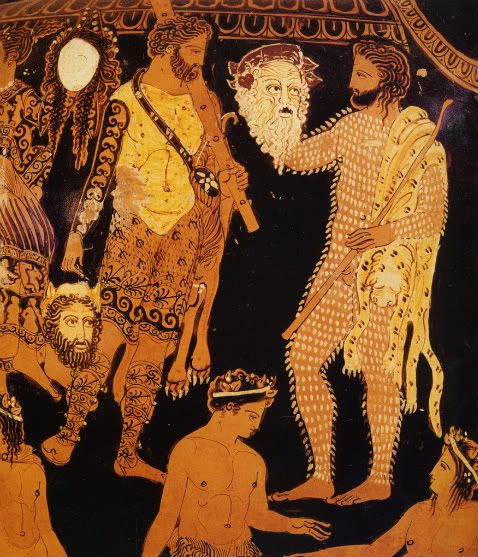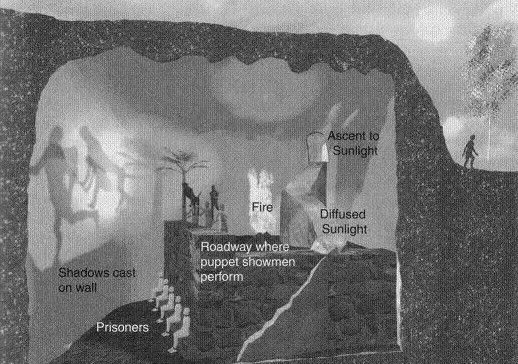
The distinction between epic and tragedy seems very clear to us. Even if we lay aside the definitions those words carry in everyday English ("epic"="awesome"; "tragedy"="really sad story"), and get technical and literary, we do pretty well with the old-fashioned, "real" definitions: an epic is a long story (properly, a long poem) about a great event (like the Iliad); a tragedy is a performed enactment of a serious action (like Romeo and Juliet). Those at least are serviceable definitions that cut through the myriad of transferred senses and connotations that have befallen these words over the many years through which they've journeyed from Ancient Greek into English. They're also the definitions I'm going to be using in this post; if you're interested in figuring out where I got the reasoning that led to them, you might have a look at a reference work or two. (Wikipedia's articles aren't terrible, either.)
The question I want to consider in this post is whether it's helpful to think about these ancient genres together in connection with our ongoing attempt to figure out what video games are good for. I'm going to suggest that by describing Bioshock as a tragedy (in a technical sense, at least) we gain the ability to relate the game to artistic tradition, and to compare and contrast its themes and cultural effects with those of other works of the tragic tradition in particular. With that ability, we may also be able 1) to assess Bioshock's cultural achievement more accurately and more effectively, and 2) to describe its artistic elements—mechanics, dynamics, aesthetics, thematics—more thickly and with more satisfying effect.
I've spent a great deal of time talking on this blog about how some of the most popular video games—in particular the standard-issue FPS and the standard-issue RPG—deserve consideration as epics in the epic tradition that goes back to the dawn of Western storytelling, and how in particular they reawaken the oral improvisatory tradition that gave us the homeric epics. But I'm going to say now that although Bioshock partakes of the same characteristics that make other FPS's epic, it uses those characteristics in a way that places it in the tradition of tragedy as well.
That is, the line between epic and tragedy is not as bright as it seems, when—as now and in the 5th Century BCE—artists like Aeschylus and Ken Levine are exploring the limits of artistic storytelling.
I feel like I can make this argument above all because the distinction between epic and tragedy was unclear to no less a crtic than Plato, who groups Homer in as a tragedian at a very important moment in a very important work, Book 10 of Republic:
Therefore, Glaucon, I said, whenever you meet with any of the eulogistsPlato makes it very clear elsewhere that he can tell the difference between epic and tragedy. In other passages he doesn't lump them together the same way, but his insights into mimesis lead him, as we should also be led, to recognize that the essential nature of tragedy somehow transcends the customary form of "performed enactment of a serious action"—that is, in Shakespeare's words, "Two-hours traffic of our stage." In this moment in Plato I find the birth of what I sometimes call "capital-T Tragedy," or "Universal Tragedy" or simply "the tragic."
of Homer declaring that he has been the educator of Hellas, and that
he is profitable for education and for the ordering of human things,
and that you should take him up again and again and get to know him
and regulate your whole life according to him, we may love and honour
those who say these things --they are excellent people, as far as
their lights extend; and we are ready to acknowledge that Homer is
the greatest of poets and first of tragedy writers; but we must remain
firm in our conviction that hymns to the gods and praises of famous
men are the only poetry which ought to be admitted into our State.
For if you go beyond this and allow the honeyed muse to enter, either
in epic or lyric verse, not law and the reason of mankind, which by
common consent have ever been deemed best, but pleasure and pain will
be the rulers in our State.
Aristotle will later try to formalize this notion into the pity – fear – catharsis meme, but I find his strictures to be ambiguous and overly-prescriptive. I would rather say that what we're dealing with is the evocation and manipulation of sympathetic identification. When we see Priam suffer, when we see Oedipus suffer, we feel for them.
If we're willing to follow Plato's reasoning, we end up with a much more flexible way of talking about the things art does to us and with us—and in particular about the things games do to us and with us. For example, we can use the idea of tragedy to talk about Bioshock.
"A man chooses; a slave obeys." This memorable line, delivered at a memorable moment, constitutes the core of Bioshock's thematics of necessity. I have argued elsewhere that Bioshock is a philosophical meditation on the relationship of culture to interactivity; my argument here runs in parallel—that this meditation expresses itself in great part in the register of necessity, and that this expression makes Bioshock tragedy.
To put that in a less complicated way, tragedy is about having no choice. The earliest of the great tragedies of Western literature, Aeschylus' Oresteia, illustrates this idea pretty well: Clytemnestra has no choice but to kill Agamemnon because Agamemnon had no choice but to kill Iphigenia; Orestes has no choice but to kill Clytemnestra because she killed Agamemnon.
It's equally important to note that tragedy's situations of "no choice" are also about the way the freedom of choice is taken away: the reason the Agamemnon, the first tragedy of the Oresteia, is effective is that from the audience's, and the tragic chorus', perspective as ordinary humans, it seems like choice is possible. Clytemnestra could refrain from killing Agamemnon. From the perspective of the characters, though—despite the fact that they claim over and over that they are acting freely—they do what they must. Clytemnestra is the spirit of revenge, the Fury of the House of Atreus: the revenge she takes is, from the divine perspective (whether you believe in some pantheon of gods or you simply see Necessity as a fundamental principle of the human condition), absolutely inevitable.
All of the other typical elements of tragedy—the pity-fear-catharsis, the suffering, the sympathy, even the perspective of the tragic chorus and the unity of time and place—, can be traced to that basic "no choice" mechanic. All of them involve the relationship of the audience to the problem of necessity. What happens when we realize that we're not in control of our own lives?
Similarly, when we realize as players of Bioshock that we really have no choice—that we can't not commit an atrocity, that we can't not disarm the self-destruct, that our "choices" about saving and harvesting little sisters are ethically meaningless—we're forced to consider what it means that from the perspective of Divine Necessity we are powerless, as Agamemnon, Clytemnestra, Orestes, and Oedipus, Antigone, and Creon are powerless.
Looked at in this light, narrative games may turn out to be the most perfect medium for tragedy ever conceived. Games in general arise in the restriction of choice just as tragedy does, after all; that's what rules and mechanics are. To this point, though, most designers have sought to construct rules and mechanics so as to preserve and to maximize the illusion that game choices are unrestricted. Bioshock is one of the few games to go in the opposite direction (Shadow of the Colossus is, in its own way, another). There are hopeful signs that more may be to come: DragonAge: Origins works the same play of necessity at several important moments.
There's much more here, and I hope to continue exploring even such relatively minor tragic elements as the unity of time and place in Bioshock, because the setting of Rapture is so fascinating. One important corollary, though, which I started trying to write into this post but which quickly revealed itself as another post in the making, is the nature of sympathy in relation to the tragic chorus and what I consider its analogue, the player-character. Could it be that having an avatar whose choices are taken away meaningfully is the same as watching a bunch of singer-dancers in masks tell you the cryptic backstory of a bloody myth?


